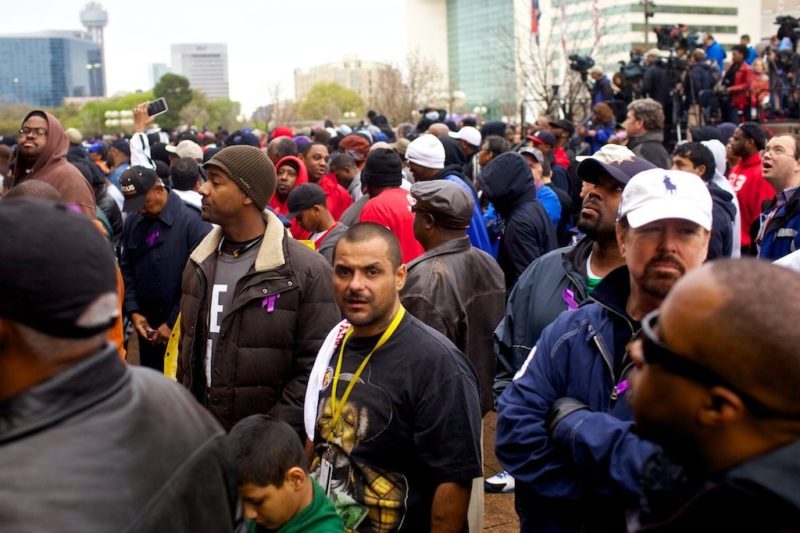Thousands Of Dallas Men Rally Against Domestic Violence: ‘It’s Our Problem’
Thousands of men gathered in Dallas on Saturday to break the culture of silence around domestic violence, encouraging themselves and their peers to take responsibility for violence against women.

Sportscaster Dale Hansen is something of a living legend in Dallas, where he’s been a nightly news staple for thirty years, building a reputation as a jokester, even a smart-ass. But he didn’t come to Saturday’s Dallas Men Against Abuse rally to talk Cowboys or make wisecracks about the Mavericks. He came to tell thousands of men what it was like growing up in an abusive home.
“My dad was the biggest, strongest man I ever knew, and he hit my mom and broke her nose,” said Hansen, his voice cracking with emotion. “Never has such a big man looked so small in the eyes of a little boy.”
The rally, held in the shadow of Dallas’ imposing concrete City Hall, drew men called to action by politicians, activists, and television personalities, by pastors, priests, and imams, and by sports figures who, in a place like Dallas, occupy an almost religious status themselves. Hours of programming featured former Dallas Cowboys Emmitt Smith and Roger Staubach and recorded messages from daytime television’s Dr. Phil and Bishop T.D. Jakes of the Potter’s House, one of the country’s largest mega-churches.
Dallas mayor Mike Rawlings organized the rally in response to the January murder of 40-year-old Karen Cox Smith, who police say was shot and killed by her estranged husband, Ferdinand Smith. Smith had been accused of trying to strangle his wife in December, and a warrant was pending for his arrest when he allegedly shot her in a parking garage on January 8th.
In the aftermath of the shooting and in light of a dramatic increase in domestic murders in the city—according to the Dallas Police Department, husbands and boyfriends killed 26 wives or girlfriends in 2012, up from 10 domestic murders in 2011—Rawlings held a press conference at City Hall earlier this year. From the Dallas Morning News:
“If I could, I’d ask all the women to leave the room,” Rawlings said halfway through his 30-minute statement at City Hall. “I want to talk to the men now. This violence is our fault.”
Though much of the programming focused on physical violence, College Football Hall-of-Famer Don McPherson opened up the scope of the event to include talk about rape, sexual violence, and emotional abuse. He said he’d never seen so many men gathered to address the problem of domestic violence in one place before.
“We call it a ‘women’s issue,'” said McPherson. “It’s our issue.”
While that message—putting the blame for domestic violence squarely on the shoulders of the perpetrators, not the victims—came across loud and clear, some of the invited speakers perpetuated some of the very harmful, misguided stereotypes and toned-down, victim-obscuring language that the mayor himself explicitly sought to toss out.
An on-stage emcee asked Kansas City Chiefs quarterback Brandon Carr what he thought of his teammate Jovan Belcher, who he described as “involved” in a domestic incident last year. Belcher was, of course, much more than “involved”; he murdered his girlfriend, Texan Kasandra Perkins, before killing himself, in December.
And when asked what he saw as the biggest problem with domestic violence today, former Dallas Cowboys quarterback Roger Staubach said that more women needed to “come forward” to report it.
Staubach’s remark directly challenged what another speaker from, of all places, Mary Kay cosmetics had to say, holding his young son up to the microphone as he spoke: “We tell women, ‘Just leave.’ But why should she have to leave in the first place?”
Much of the messaging at the rally centered around what it means to be a “real man,” with a number of speakers using essentialist language that, while it may speak to many, reduces both men and women to strict, gender-defined roles, with men as heads of household and women as gentle helpmeets. Speakers repeatedly referred to women as “precious” and “fragile” gifts from God, things to be protected by big, strong, “real” men, saying, “Anyone who hits a woman isn’t a real man,” and “Real men don’t hit women.”
Other speakers invoked the popular “mothers, wives, sisters, daughters” rhetoric, used so often in attempts to appeal to those who would apologize for violence and abuse against women, which seemed to move many in the crowd—after all, domestic violence so often affects women not despite the fact that they are mothers, wives, sisters and daughters but because they are mothers, wives, sisters and daughters. The trouble is, as Anne Thériault eloquently wrote last week in the wake of the Steubenville rape verdict, that this characterization often serves only to advance “the idea that a woman is only valuable in so much as she is loved or valued by a man.”
Certainly the men in the audience that Rewire spoke to saw themselves, as well as their mothers, wives, sisters and daughters, as victims of domestic violence. Byron Sanders and Christian Yazdanpanah, 29-year-olds living in Dallas, said they both grew up in abusive homes but had never before spoken to each other about it before the rally was announced.
“I grew up in an abusive house, but we just put that under the rug,” said Sanders, recalling how his family would pretend nothing was wrong when “company” would visit. Yazdanpanah grew up in a similar situation, but it wasn’t until he got an e-mail from Sanders inviting him to the rally that he ever told his friend that they shared a similar history.
Sanders said he saw the rally as “blow” against the culture of silence around domestic violence.
“We never talk about this,” agreed Yazdanpanah.
But that changed, at least for those two young men, on a cloudy Saturday in Dallas, Texas.

